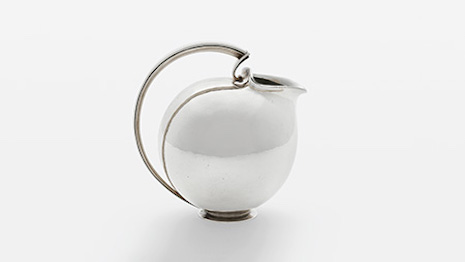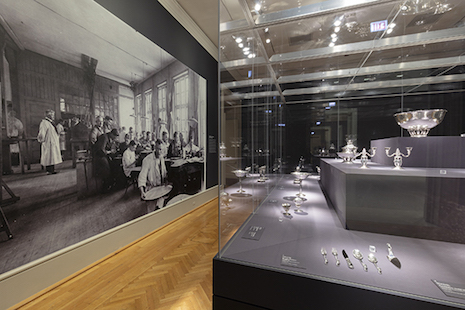 Georg Jensen is the subject of an exhibit at the Art Institute of Chicago. Image credit: Art Institute of Chicago
Georg Jensen is the subject of an exhibit at the Art Institute of Chicago. Image credit: Art Institute of Chicago
Danish design house Georg Jensen’s impact on modern living is being explored through an exhibit at the Art Institute of Chicago.
“Georg Jensen: Scandinavian Design for Living” explains the rise in popularity of Scandinavian design all over the world through the lens of the silversmith. This is the first major U.S. retrospective on Georg Jensen, allowing a new audience to gain an understanding of the house’s history and place in home design.
Modern living
Georg Jensen founded his eponymous design company in 1904. The exhibit follows the impact that the brand had on bringing a Scandinavian aesthetic to homes outside of the region.
The Chicago exhibit will feature more than 100 silver pieces, as well as tableware in materials such as wood, melamine and stainless steel. Georg Jensen furniture designs will also be displayed, including an array of chairs from the museum’s archives.
Georg Jensen exhibit at the Art Institute of Chicago. Image credit: Georg Jensen
Georg Jensen’s archives also lent a number of items to the Art Institute of Chicago for the exhibit.
Over its more than a century of history, Georg Jensen has worked with a number of designer collaborators, including Johan Rohde, Sigvard Bernadotte, Henning Koppel, Nanna Ditzel and Vivianna Torun Bülow-Hübe (see story). Works from these individuals will be featured in the exhibit.
“While Danish furniture is well known to design enthusiasts today, visitors to the museum will be surprised by the magnificent works in silver from the early decades and bold products in stainless steel produced by Georg Jensen in the postwar period,” said Alison Fisher, Harold and Margot Schiff associate curator at the Art Institute of Chicago, in a statement. “We hope they come away with a new appreciation for the role of this company and its talented designers within Scandinavian history and a larger context of modern design.”
Georg Jensen: Scandinavian Design for Living
The exhibit will be up through Sept. 9.
Consumers in the United States are shifting their ideas of luxury, expecting more than just quality aesthetics as they now look for both beauty and usefulness.
According to a new survey from Volvo and The Harris Poll, 68 percent of Americans agree that “less is more” in regards to luxury.
Cleanliness, spaciousness and functionality are the top characteristics Americans look for in luxury spaces, at 55 percent, 50 percent and 45 percent, respectively. Elaborate and ornate, which were previously cherished luxury traits, are seen as less important with only 37 percent and 16 percent, respectively, of those surveyed feeling these are most important.
These modern traits hail from Scandinavia, and 61 percent of Americans believe that modern luxury is represented with Scandinavian design (see story).

